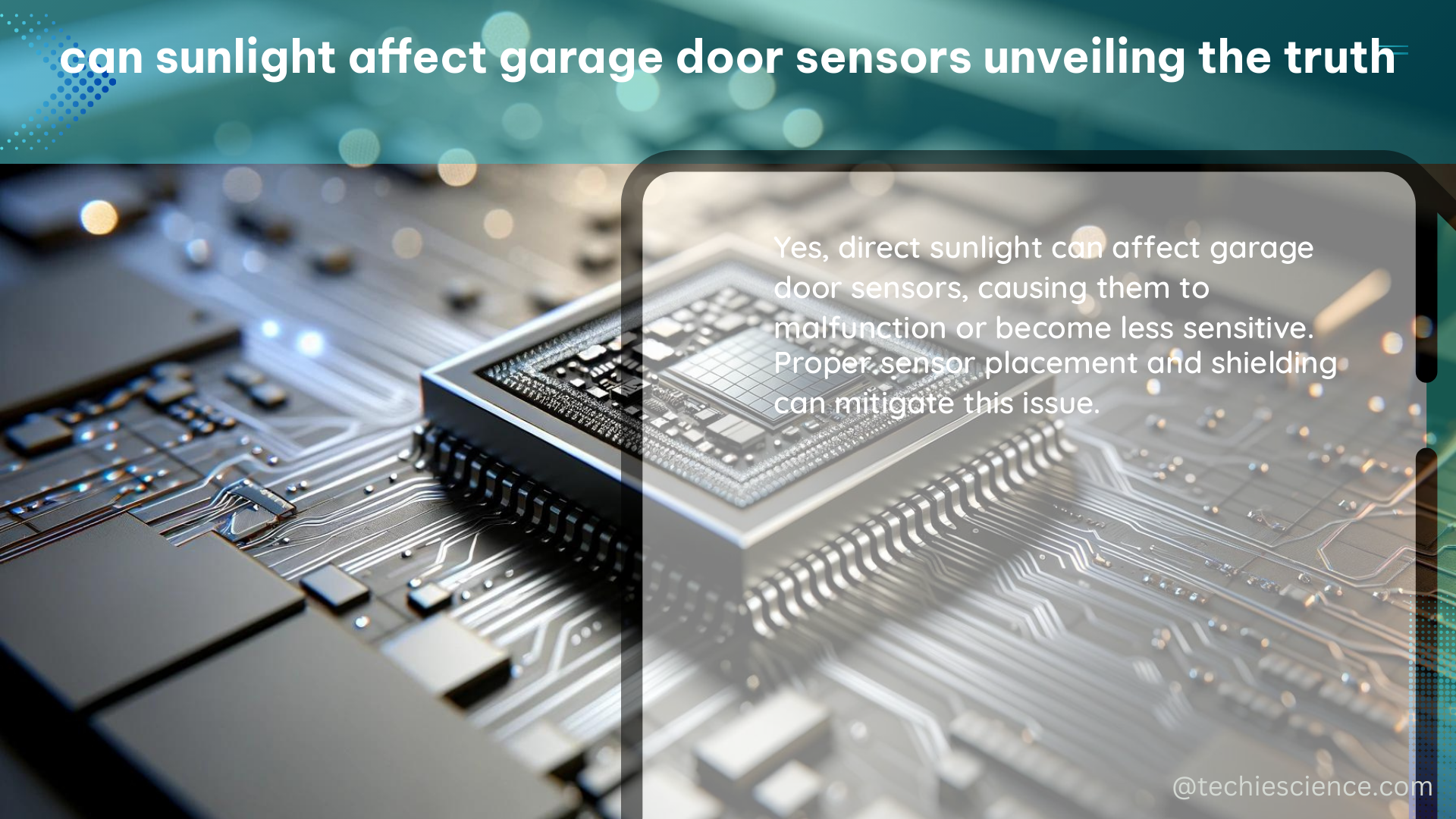Sunlight can indeed affect the proper functioning of garage door sensors, which use infrared light to detect if anything is blocking the garage door from closing properly and securely. The infrared light from the sun is more powerful than the light of the sensors, and if the sun’s light surpasses the sensors’ infrared light, the sensors might not be able to signal one another, causing the garage door to not operate properly.
Understanding the Impact of Sunlight on Garage Door Sensors
-
Infrared Sensor Technology: Garage door sensors use infrared light to create an invisible beam between the two sensors, one on each side of the garage door opening. When the beam is broken, the sensors signal the garage door opener to stop and reverse the door’s movement.
-
Sunlight Interference: The infrared light from the sun is more powerful than the light emitted by the garage door sensors. If the sun’s infrared light is strong enough, it can overwhelm the sensors’ signal, causing them to fail to detect the break in the beam and allowing the garage door to close even when an object is in the way.
-
Seasonal Variations: This issue is more likely to occur during the summer months when the sun is higher in the sky and its rays are more direct. The problem is most prevalent when the sun is close to the horizon, such as in the early morning or late afternoon.
-
Geographical Factors: Homes with garages that receive a lot of direct sunlight throughout the day are more prone to this issue. The orientation of the garage door and the surrounding landscape can also contribute to the severity of the problem.
Compensating for Sunlight Interference

-
Sensor Shielding: One solution is to use simple materials like toilet paper rolls or PVC pipes to create a shield that blocks the sun’s rays from directly hitting the sensors. This helps to direct the infrared beam between the two sensors and prevent interference.
-
Sensor Relocation: Moving the sensors further into the garage and out of the direct sunlight can also help mitigate the problem. Alternatively, switching the positions of the sensors can sometimes resolve the issue.
-
Sensor Cleaning: Regularly cleaning the sensors and the emitter with a glass cleaner can help ensure that any dirt or debris is not interfering with the infrared beam.
-
Sensor Adjustment: In some cases, adjusting the sensitivity or alignment of the sensors may be necessary to compensate for the stronger sunlight.
Balancing Sunlight Benefits and Sensor Functionality
While addressing the issue of sunlight affecting garage door sensors is important, it’s also crucial to consider the benefits of strong sunlight. Direct sunlight can provide several advantages, such as:
- Warmer indoor temperatures, reducing the need for heating
- Reduced risk of mold and mildew growth
- Improved mood and well-being for occupants
Therefore, finding a solution that allows for the benefits of sunlight while also ensuring the proper functioning of garage door sensors is key. Using shields or relocating the sensors can help solve the issue without completely blocking out the sunlight.
Conclusion
Sunlight can indeed affect the proper functioning of garage door sensors, but with the right solutions, homeowners can ensure the safety and security of their garage and home while still enjoying the benefits of strong sunlight. By understanding the underlying technology, recognizing the seasonal and geographical factors, and implementing effective compensation strategies, you can keep your garage door sensors working reliably, even in the face of direct sunlight.
References:
– Can Sunlight Affect My Garage Door Sensors?
– Can Sunlight Exposure Affect Garage Door Sensors?
– Can Sunlight Affect My Garage Door Sensor?
– How do I compensate for the sun confusing my garage door opener’s sensors?
– Can Sun Affect Garage Door Sensor?

The lambdageeks.com Core SME Team is a group of experienced subject matter experts from diverse scientific and technical fields including Physics, Chemistry, Technology,Electronics & Electrical Engineering, Automotive, Mechanical Engineering. Our team collaborates to create high-quality, well-researched articles on a wide range of science and technology topics for the lambdageeks.com website.
All Our Senior SME are having more than 7 Years of experience in the respective fields . They are either Working Industry Professionals or assocaited With different Universities. Refer Our Authors Page to get to know About our Core SMEs.